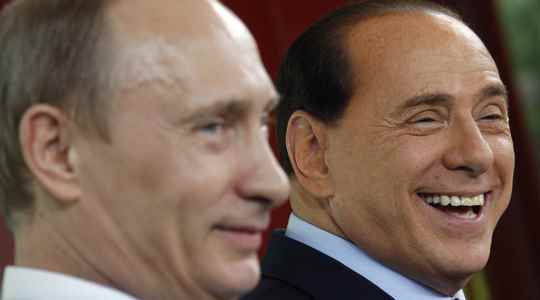“I was brought in to talk about Biden, the opinion of the population and of American entrepreneurs on Russia, but I was never able to talk about it: in four hours of broadcasting, I had the floor two minutes, in front of Russian priests, a pro-Russian journalist in duplex from the Donbass and another journalist from the Russian press agency Sputnik, who assured that Russia is a transparent and democratic country…” Invited to one of the most watched talk shows in Italy, Nina Luzzatto Gardner, lawyer and professor at the American Johns-Hopkins University, was stunned by this scenography.
Circus show
The Italians are used to it. Since the invasion of Ukraine, the Russians have been very present in the transalpine talk shows, designed as machines to create buzz, halfway between information and circus spectacle. With regular “good clients” like Nadana Fridrikhson, star of the Zvezda channel, owned by the Russian Defense Ministry; Alexander Dugin, the ideologue behind Vladimir Putin’s annexation of Crimea in 2014; Maria Zakharova, spokesperson for the Russian Foreign Minister (Sergueï Lavrov); or even Vladimir Solovyov, journalist friend of Vladimir Putin.
Among the most shocking moments, a chain of Silvio Berlusconi’s group retransmitted on May 1 an interview – without contradiction – of Sergei Lavrov, during which he affirmed that “Hitler had Jewish blood”. Faced with the multiplication of slippages, a parliamentary committee for the security of Italy has launched an investigation into disinformation in the Italian media and suspicions of Russian interference. To make matters worse, Lavrov, like Soloviev, are targeted by European Union sanctions. “We cannot invoke the freedom to inform to circumvent the sanctions”, choked the spokesperson for the European Commission.
Useful idiots
This media offensive owes nothing to chance. “Russia deliberately targeted Italy in its Hybrid War using fake news and disinformation”, declares Adolfo Urso, former journalist, senator (Fratelli d’Italia, extreme right) and president of the body in charge of the investigation, which evokes campaigns on social networks and payments of money to useful idiots.
The media deny being manipulated, pleading the need to hear all the parties. “Inviting Sergei Lavrov to hold a monologue on Mediaset is neither pluralism nor journalism. Christiane Amanpour’s interview with Dmitri Peskov (Kremlin spokesperson) on CNN was. Because if the interviewee disinformation, she stops it. But in Italy, it doesn’t work like that,” says Nathalie Tocci, director of the highly respected Institute of International Affairs in Rome.
The question of Russian influence in Italy arose from the start of the war in Ukraine, with the media coverage of Alessandro Orsini, professor of sociology of terrorism at Luiss University, Rome, hitherto unknown and sudden ubiquitous on public television. From the outset, Orsini asserts that “Putin has won the war” and that Italy should dissociate itself from the EU and NATO in the name of peace. For six broadcasts, RAI agreed to pay him 12,000 euros.
More than one in two Italians against arms shipments
The rhetoric of Italian journalists and politicians playing into the hands of the Kremlin is always the same: Volodymyr Zelensky is a pawn used by US President Joe Biden, who is waging a proxy war in Ukraine against Putin, sanctions against Russia will ruin the Italy and sending arms to Ukraine only prolongs the agony of the Ukrainians. Part of the public opinion follows. According to the polling institute Ipsos, 24% of Italians believe that Russia is right to feel threatened by NATO, while 42% are opposed to sanctions. More than 1 in 2 Italians want their country to stay out of the conflict and refrain from sending arms to Ukraine.
In the political class, there are fifty shades of support for Russia. On the far right, Matteo Salvini, the leader of the League and great admirer of the head of the Kremlin, finds the war “horrible”, but is content to judge the aggressor “disappointing as a man”. The League signed a twinning agreement with Putin’s United Russia party in Moscow in 2017, without ever proving that it had denounced it since. Former Prime Minister and leader of the 5 Star Movement (populist) Giuseppe Conte is ambiguous. And Silvio Berlusconi, who had long intimate ties with the head of the Kremlin, has clearly chosen his side. He openly contests the sanctions against Russia to “save work in Italy”. According to the founder of Forza Italia, “we must stop this war as soon as possible and convince the Ukrainians to accept Putin’s demands”. Of the four parties in the ruling coalition, only the Democratic Party remains upright in its Atlanticist and European boots.
Election period
“It is only in Italy that we give so much space to anti-Ukrainian theses, analyzes General Vincenzo Camporini, former chief of staff of the armies. We are in the electoral campaign [élections locales en juin, NDLR] and this is a very useful argument for those who want to gain votes by playing on the populist rope.” Not to mention, he recalls, that Italy lived through the Cold War under two determining influences, that of the Catholic Church, relayed by the Christian Democracy, sensitive to ecumenism and pacifism, and that of the Communist Party, which has long allowed Moscow to weave links in the country that survived the collapse of the USSR.
According to this senior officer, “many indications show an active Russian campaign to influence the media”. This has increased with social networks. “We realized it late and our lines of defense are not yet up to the challenge,” he sighs. Still, there needs to be a real collective will to take it up.
